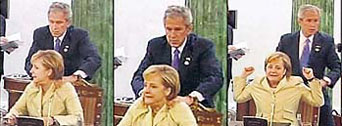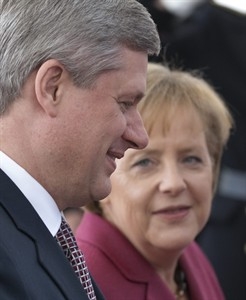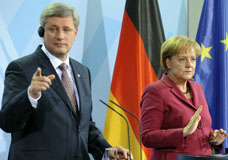Angela Merkel tells naked truth about Greek financial crisis?
May 6th, 2010 | By Counterweights Editors | Category: In Brief
President Barack Obama and First Lady Michelle Obama are welcomed by German Chancellor Angela Merkel and her husband, professor Joachim Sauer, to Rathaus in Baden-Baden, Germany. April 2009.
UPDATED MAY 8: As obscure as it may otherwise seem, the Greek financial crisis (“New protests as Greece approves austerity bill”)Â has now reached inside our still deeper obscurity in the true north of North America, etc, etc (“Canada’s Dollar Touches Lowest Since March on Greece’s Crisis”; “Loonie sinks as gold swims”). One further consequence is that the Toronto stock market index has now fallen almost as low as it was late last year.
So even in the Canadian wilderness, it’s worth trying to figure out just what the Greek crisis means. Fortunately – or otherwise, depending on your point of view – the German chancellor Angela Merkel has just told the kind of tale out of school that we seldom get in the English-speaking world, where the traditional hegemony of the financial markets may still be much greater? (One virtue of the age of the globalizing internet is that Ms. Merkel’s kind of intelligence is more at the fingertips of we mere mortals than it used to be, even in English.)
An AFP report (which we found on the Yahoo Canada site, under the headline “Merkel blasts ‘treacherous’ banks in Greek crisis”) reveals the German chancellor’s strikingly clear view of what is happening in a few succinct sentences: “First the banks failed, forcing states to carry out rescue operations. They plunged the global economy over the precipice and we had to initiate recovery packages. Because of these packages, we have become indebted and now, they are speculating against these debts – that is really very treacherous.”
Ms. Merkel carries on:“Governments must regain their supremacy over the markets, which they no longer have, and for that we need much stricter global rules … We must clearly demonstrate that in Europe we have the political power, each in his own country, of getting back on the track of the Stability and Growth Pact … It is a fight of policy against the markets. That is how I see it personally but I am determined – as are my colleagues, I am certain – to win this fight and we will be victorious, I am sure.”
To much of the current anglophone right – looney tea-party and otherwise – Ms. Merkel’s reflections no doubt sound like Socialism with a capital S. But she is the leader of Germany’s largest conservative party, and in the past has been “considered to be more pro-market (and pro-deregulation) than her own party.” She has similarly “advocated a strong transatlantic partnership and German-American friendship,” which has “led some critics to characterize her as an American lackey.” (And, remember, all this was back in the days of George W. Bush, who tried to show his appreciation to Ms. Merkel by massaging her neck in public.)
There is a parallel report on Angela Merkel’s latest revelations on the Bloomberg Business Week site (“Merkel Invokes Market ‘Battle’ as Germany Votes on Greece Aid”). It pulls her most aggressive “policy against the markets” punches more than the AFP report. It seems clear as well that our Conservative minority government in Canada has even less sympathy with the German chancellor. See, eg: “Canada, EU at loggerheads over bank tax.”
Some will see the Harper regime’s positioning of Canada in this new global struggle of governments to “regain their supremacy over the markets” as just another international embarrassment in a growing list. Others will point hopefully to such thoughts as: “Should the Americans and Europeans press ahead with taxes on their banks while Canada holds firm in its opposition – an increasingly likely scenario – foreign banks operating in financial centres such as New York and London might look at picking up and moving to Toronto.”

President George W. Bush giving impromptu neck massage to German Chancellor Angela Merkel at the G8 Summit in St. Petersburg, Russia, July 2006. Photos: ZDF, German Television.
Still others will no doubt dismiss such thoughts as hubristic pie in the sky at best, and urge that it hasn’t in fact been the Harper minority government’s kind of economic and financial policies that allowed Canada’s financial system to weather the latest global economic storms comparatively unscathed. Still others again will agree with the labour economist Jim Stanford: “Bottom line: Canadian banks should pay their fair share.” At some point in the not too distant future, perhaps, we are all, even in Canada, going to have to decide more clearly (and more painfully?) just which side we want to be on, in the interests of just who, where, when, why, what and all that.
UPDATE MAY 8: Reports in the Canadian media today suggest a more blurry message than the May 6 AFP report, and you have to wonder what this means. The recent carnage in the stock markets, especially this past Thursday, appears to have modified Ms. Merkel’s views somewhat – and even restored something of “the traditional hegemony of the financial markets” in her own mind. She is now urging governments to “reduce their deficit with determination and great speed,” while still stressing the “need” for “a strict regulation of the financial markets.” At the same time, it also seems clear enough that she still has a rather different view of what is going on than, eg, Stephen Harper. If you have the stomach for further details read on …

PM Harper speaks with Chancellor Merkel as he arrives at the Chancellery in Berlin, Germany Saturday, May 8, 2010. THE CANADIAN PRESS/Adrian Wyld.
Globe and Mail report: [Italics added] Merkel calls on EU to cut deficits with ‘great speed’ … Following meeting with Harper, German chancellor outlines plan to stop spread of Greek crisis … The night before, Ms. Merkel was in Brussels with her E.U. counterparts where they assigned their respective finance ministers to craft a financial plan that is in addition to the $140-billion (U.S.) rescue package already pledged jointly with the International Monetary Fund … The drop in markets throughout the past week fuelled speculation that the package would not be enough to stop Europe’s debt troubles from ultimately triggering a double dip global recession … The IMF, which meets Sunday to approve its share of the bailout, had stated Friday that the plan is sufficient and that the nervous reaction from stock markets is overdone … That had also been the E.U.’s position up until Friday night, but clearly the situation has changed … “Yesterday at the meeting of the heads of governments of the Euro group we took a key step beyond that program because we believe the security of the Euro zone as a whole is not guaranteed with this program alone,” said Ms. Merkel … “This is why we decided upon three measures. The first of which is that all members of the Eurozone have to reduce their deficit with determination and great speed. Secondly we need a strict regulation of the financial markets that includes the European markets… and a third point, we will undertake a joint effort, that is to say develop a joint instrument, a European instrument, that will help us respond to threats to the Euro zone not only affecting one country but a response that allows us to act together in order to make it clear that we stand together by the stability of our currency.”

PM Harper and Chancellor Merkel speak at a news conference in Berlin, May 8, 2010. MICHAEL GOTTSCHALK/AFP/GETTY IMAGES.
Toronto Star report: [Italics added] Harper, Merkel call on countries to rein in debt … Prime Minister Stephen Harper and German Chancellor Angela Merkel emerged from a meeting here Saturday afternoon with a similar recipe for coping with the financial upset, a topic that will now dominate discussions when G20 leaders meet in Toronto in June … “All members of the Eurozone have to reduce their deficit with determination and great speed,” Merkel said … “We need strict regulation of the financial markets,” she said, citing derivatives, short selling and hedge funds by name … “I think it’s important that we act with determination and at the same time calm in responding to the situation,” she said … While the European Union has spearheaded a package of loans to assist Greece, Merkel said the “stability of the Eurozone as a whole is not guaranteed with this program alone.” … “We all have to do our homework and make sure our structures are sound. It will then be more difficult for speculators to gain ground,” she said … “We have to ensure that we regulate the instruments that are being used to speculate and to do so in a way that they cannot be abused, you know, bet on things that you don’t even ownership of,” she said … Harper echoed the call for faster financial sector reforms, saying progress “has not been as quick as we would like to see … “It is important that we continue to work strongly and aggressively on reform of the financial sector, nationally and internationally,” Harper said … However, he pinned the blame for the current crisis more on the practices of individual countries, which have allowed debt loads to spiral out of control … “The fundamental crisis here is not in the financial sector. It is in the finances of certain governments,” Harper said.
See also: Vancouver Sun: Harper blames ‘certain governments’ for economic turbulence ; Canadian Press: Harper greeted by EU currency crisis in Berlin ; Business Week: Merkel Says Response to Spread of Greek Crisis to Be ‘Decisive’ ; AFP: Crisis affects ‘some countries’, not financial sector: Canadian PM ;Â AFP: Obama ‘very concerned’ about Greek debt crisis ;Â NY Times: Thursday’s Stock Free Fall May Prompt New Rules.
